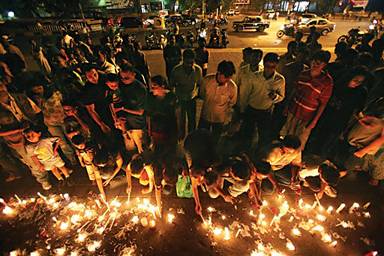FREDERICK: Terror in India

Residents of Mumbai, Sunday, Nov. 30, 2008, hold a candle light ceremony and a protest after attacks on the city killed at least 174 people. The death toll was revised down Sunday from 195 after authorities said some bodies were counted twice, but they said it could rise again as areas of the Taj Mahal were still being searched. Among the dead were 18 foreigners, including six Americans. Nine gunmen were killed. (AP Photo/David Guttenfelder)
November 30, 2008
America on Thursday: turkey, stuffing and family. Conversations, football and pumpkin pie. Fall leaves, a chill in the air and thanks for many things.
A world away? Violence, strife, gunfire. A surprise attack.
Nameless, faceless terrorists bent on nothing more than death, destruction and terror.
Two sides of one world, seemingly worlds apart and yet intimately connected.
Islamic terrorism felt the need last week to remind us all that it is by no means dead and has in no way diminished its ability to wreak coordinated havoc against the innocent, the unarmed and the unsuspecting.
How cowardly.
How perverse.
How sick.
A 13-year-old girl and her father from Virginia; a Brooklyn, N.Y., rabbi and his wife — their lives ended, apparently owing to their citizenship.
What danger were these people?
The news — slowly, painfully rolling out of India — tells us a story.
Quickly becoming apparent is the fact that this was, perhaps, less an attack on India, its people and its institutions than it was on Americans and the West.
The news has been filled with accounts of gunmen seemingly taking care to identify Americans and Britons among their hostages, as just one example.
We’ve been targeted — all of us, as Americans — black or white, Jew, Catholic, Democrat, Republican, New Yorker, New Mexican or Iowan.
Just over seven years after the attacks on New York and the Pentagon, we are still targets.
Perhaps it is to the credit of the Department of Homeland Security that nothing on this scale has happened in this country — we’ll never know for sure.
One thing is certain, however: We must remain vigilant.
As one of the great George C. Marshall’s signature phrases related, “The price of peace is eternal vigilance.”
There can be no doubt that these demons, these monsters, these enemies of freedom, reason and progress are an anonymous, faceless and dastardly evil.
Not that there was ever any doubt about that to begin with.
As such, they must be hunted down.
There is no option here — neither debate nor discussion can change the facts of the basic existence of this evil.
This evil is swayed by neither compassion, nor kindness nor pity. No amount of bargaining or emotional appeal breaks through to a motivation such as theirs.
Brute, unrecognizable, unreasonable terror knows only one equalizer: force.
If history is any lesson, this is also an evil that fears not death. That being the case, retribution ought to be swift and sure. An unwavering foe requires an unwavering response.
If Sept. 11, 2001, showed us anything, it’s that Americans’ shock and sadness can eventually turn to rage.
It should be no different now. The events in India are an affront to us as Americans, as citizens of the free and civilized world and as decent and reasonable people.
Last week’s events may have unfolded in India, but that should make them no less audacious, no less appalling, no less insulting and no less criminal than if they’d happened on this side of the Pacific.
Let this be a wake-up call.
Amid financial crises, elections and all our other diversions, we’ve often forgotten our vulnerability, referring to it at most in vague and evasive allusions in debates and advertisements.
Just as in Gen. Marshall’s time, more rests on our vigilance than merely peace. Justice, freedom, liberty — the blessings of a free state — all things we value and esteem, are at stake here.
Whilst we quarrel over the rights of homosexuals, decry the expression of various religions in public places and even as we await the inauguration of a president whose race largely couldn’t vote just a few decades ago, outside the gates the very notion of discussion, or the idea of, for instance, differing religions, is anathema.
Women’s rights? Not in Saudi Arabia. Religious freedom? Not if Osama bin Laden or Abu al-Masri have anything to say about it.
We cannot relax our guard and we cannot allow our sentries to fall asleep at their posts.
Liberty and freedom are far too great of things and our enemies are far too cunning and merciless to allow that to happen or to permit the consequences of inaction.
This is now, almost undoubtedly, the most severe, widespread and tenacious challenge to our civilization and our principles since the end of the Cold War and the most barbaric and insatiable since the end of the last World War.
Our castle walls must be high and well defended, the sentries sharp and their commanders creative, or surely history will judge us all as fools.
If we fail in this capacity, we have failed all of Western civilization, and all of that great and glorious history — the long journey from Socrates and Plato to today — which brought us those ideals we now cling to so dearly and which the enemy so derides.
















